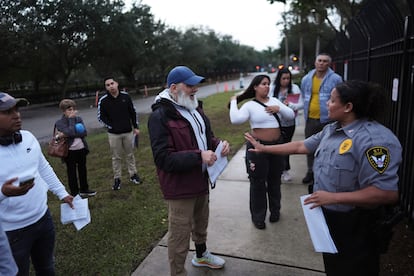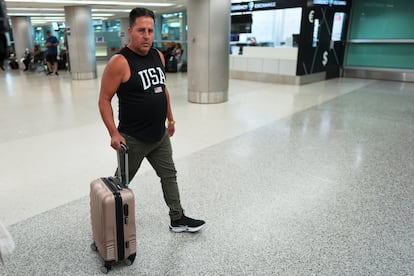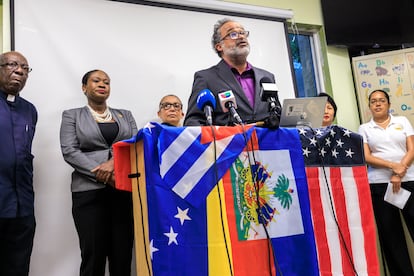No trips or family reunions: Trump’s latest betrayal of Cubans and Venezuelans
The travel ban is seen as a show of disloyalty to two communities that supported the Republican: ‘One day he takes one thing from us, the next day something else’


If Marcos can’t leave in the coming days — that is, pack his suitcase, say goodbye to his family, catch a plane at Havana airport, and land in the United States in a matter of minutes — it will be because he obeyed the law. He has waited nine long years to be reunited with his father. He refused to pay a coyote (smuggler), take any migratory route through Central America, arrive in Mexico, and cross the border as an illegal immigrant. Now, that the day of his appointment at the Havana embassy has arrived, Donald Trump has announced that Cuba is one of the 12 countries whose citizens will be restricted from traveling to the United States starting this Monday. Marcos is nervous. His family and friends can’t believe it. No one knows exactly what will happen.
“They’re all devastated. It’s nine years of his life that no longer make sense,” says his friend Mabel Cuesta, a Cuban academic based in Houston, who shared the story with EL PAÍS. “He waited all this time to go through a legal process, just as the U.S. government requires, and the reward for that commitment to legality is to punish him.”
Marcos, 32, whose name has been changed to protect his legal process, went to the U.S. diplomatic mission in Havana last Thursday to apply for an F2B visa, which is granted to unmarried sons and daughters over the age of 21. Although the application was approved, the visa has not yet been issued by consular officials. At 12:01 a.m. this Monday, everything changed for Cubans like him— both immigrants and non-immigrants — with B-1, B-2, B-1/B-2, F, M, and J visas. “Now he’s in limbo; he might not be able to travel,” says Cuesta.
These are the consequences of the latest measure taken by the Trump administration to curb the entry of foreigners into the country — just as it had set out to do from its first day in the White House, and as it did during its first term. While in 2017, the travel bans targeted around eight countries, mostly Muslim-majority; now, the ban has been extended to others in Africa and the Middle East, and, in the Americas, to Haiti, Cuba, and Venezuela. The Cuban and Venezuelan diasporas — particularly affected since the Republican’s re-election — did not hesitate to support Trump in the November elections.
Regarding Cuba, Trump stated in his recent announcement that it is a state sponsor of terrorism, whose government “does not cooperate or share sufficient law enforcement information with the United States,” has “historically” refused to accept the repatriation of its nationals, and, on top of that, has a 7.69% “overstay rate” for B-1/B-2 visas and an 18.75% rate for F, M, and J visas.
As for Venezuela, Trump offered a similar justification: that the country “lacks a competent or cooperative central authority for issuing passports or civil documents;” does not have screening and vetting measures; has “historically” refused to accept back nationals; and has a 9.83% overstay rate for B-1/B-2 visas.

‘I hope the community is feeling this as yet another blow’
The travel restriction on Cubans and Venezuelans comes after the suspension of humanitarian parole and Temporary Protected Status (TPS), which had granted them certain benefits in the United States. Little by little, the U.S. government has stripped them of work permits, legal protections, and any form of assistance they previously had access to.
Cathy Camionero, a 54-year-old Venezuelan living in Virginia, believes that more than a measure to ensure “national security,” as Trump claims, this is a “racist action, meant to segregate and justify measures that don’t respect due process,” she says.
Camionero says that many, like her, won’t be able to welcome visiting relatives from Venezuela this year — relatives who typically attend their children’s graduations. “This is a time of vacations and graduations,” she says. “Many of us in this country wait for our loved ones, our parents, our grandparents, to come and witness the graduations of our children, who grew up here or graduated here. Now they can’t come celebrate with us.”
Still, she’s not surprised by this measure, because her community has been among the most battered since Trump came to power. “One day he takes one thing from us, the next day something else. He wants to deport Venezuelans without negotiating due process, yet at the same time he negotiates with [Venezuelan President] Nicolás Maduro. There’s a lot of inconsistency in this government,” she argues.
That’s why some feel this measure — like other anti-immigrant policies from the White House — feels like a betrayal of the communities that voted for Trump, who now feel the president has turned his back on them. Cuesta says it’s “yet another abandonment,” and “another betrayal.”
The Cuban-American community, to which Cuesta belongs, traditionally votes Republican, and “this president, since taking office, has done nothing but continue to marginalize the most vulnerable segments of the Cuban American family — that is, those who are still in Cuba or those who have arrived in recent years.”
“It’s yet another demonstration of how, in this white supremacist order, any alternative subject who demonstrates otherness — and that’s the case in Cuba, even if they don’t want to admit it — will be marginalized and basically put at a disadvantage,” the academic says. “I hope the community is experiencing it for what it is, as another blow to the possibility of reinventing ourselves in exile.”

An ‘arbitrary and profoundly cruel’ measure
The decision to ban and restrict travel from a dozen countries apparently came after an attack by an Egyptian citizen on a group advocating for the release of hostages in Gaza. Although Egypt is not on the list of restricted countries, the incident was enough for Trump to once again lash out at those trying to come to the United States. “We don’t want them,” he said in a video announcing the new measure, which has thrown tourists, regular travelers, students, and family members into uncertainty. As a result, it’s been opposed by several groups and organizations.
“We’re talking about hundreds of thousands of U.S. citizens who won’t be able to see their grandparents, aunts, and uncles, no exceptions,” María José Espinosa, a foreign policy expert and executive director of the Center for Engagement and Advocacy in the Americas (CEDA), tells EL PAÍS. “These people have visas valid for five years. They are people with legal documentation, who have come to the country to visit their families or to participate in academic, commercial, and cultural exchanges.”
According to Espinosa, recent history shows that travel bans, such as those implemented under the Trump administration, “have not proven to be effective tools in preventing real threats of terrorism. Rather, they have isolated the United States and weakened its position in the world.” In addition to arguing the measure “arbitrary and profoundly cruel,” the CEDA director goes further, insisting that it is also legally confusing and “promotes chaos.”
“The proclamation states that those who already have visas will be able to keep them. A State Department spokesperson said that even if people already have a visa, they won’t be able to use it while the proclamation is in effect,” she says. “It’s curious that after so many years of preparing this proclamation, the final version is so confusing.”
Indeed, the measure has caused anxiety and confusion among many who were planning to travel to the U.S. soon. Although the announcement states that people with valid visas are exempt from the ban — as are permanent residents, athletes, and Afghan beneficiaries of the Special Immigrant Visa program — no one feels truly safe from the reach of Trump’s order.
“When news like this happens, it’s inevitable to feel concern and unease,” says a young Cuban woman who asked to remain anonymous and is about to start a PhD at the University of Pennsylvania. “I’ve always felt that anything could affect my entry into the United States. Nothing guarantees entry, even if you have an approved visa.”
Although she has been concerned about her future since the start of Trump’s second term, she says that now “the atmosphere feels more tense than usual.” “My status as a citizen of one of the countries included on this and other lists puts me in a position of absolute vulnerability and instability,” she insists.
Sign up for our weekly newsletter to get more English-language news coverage from EL PAÍS USA Edition
Tu suscripción se está usando en otro dispositivo
¿Quieres añadir otro usuario a tu suscripción?
Si continúas leyendo en este dispositivo, no se podrá leer en el otro.
FlechaTu suscripción se está usando en otro dispositivo y solo puedes acceder a EL PAÍS desde un dispositivo a la vez.
Si quieres compartir tu cuenta, cambia tu suscripción a la modalidad Premium, así podrás añadir otro usuario. Cada uno accederá con su propia cuenta de email, lo que os permitirá personalizar vuestra experiencia en EL PAÍS.
¿Tienes una suscripción de empresa? Accede aquí para contratar más cuentas.
En el caso de no saber quién está usando tu cuenta, te recomendamos cambiar tu contraseña aquí.
Si decides continuar compartiendo tu cuenta, este mensaje se mostrará en tu dispositivo y en el de la otra persona que está usando tu cuenta de forma indefinida, afectando a tu experiencia de lectura. Puedes consultar aquí los términos y condiciones de la suscripción digital.








































